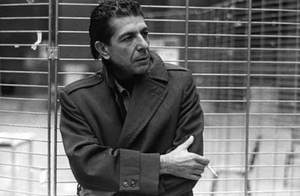It has been written that we love so that we know we are not alone. The outpouring of love for Leonard Cohen this past week has brought all Montrealers together. In our grief, with pain falling drop by drop upon the heart, no one was alone here.
From the hundreds who stood in near freezing temperatures outside his now iconic greystone on rue Marie-Anne to the musicians who appeared - seemingly spontaneously - in various sites singing Cohen's songs to the artists painting canvas tributes. No one was alone. Love was in the air in this time of sadness. A love born in the poetic pathos of the words of this most gifted son of this island.
The powerful came. Three Quebec Ministers came to the house off the Main to pay tribute and laid wreaths. The Mayor announced there would be a special tribute concert.The people for whom he sang, and whose pain was reflected in his words, came and lit scented candles and incense. But all felt that a piece of each of us had died. Perhaps the most touching words came in a statement from the Conseil des arts et des lettres du Québec. It said in part, "C’est avec une infinie tristesse que nous avons appris le décès de Leonard Cohen, avec le sentiment d’être orphelins, partagé mondialement par tous ceux que son œuvre immense a touchés."
Infinite sadness. With the feeling of being orphaned. Those phrases say it all.
But what was it about Leonard's passing - and he will always be Leonard as he always wished it to be - that has torn such a gash in our hearts? Perhaps the answer can be found in several emails we received. The writers did not want them published. One wrote that Cohen's words helped her make her youth "bearable." Another wrote that Leonard's songs made her feel she was not alone, though in her life she had always been alone.
 Leonard Cohen made us remember that this life is not all about the pragmatic and the practical. It's not all about how much money you make or what political angles you can make work. It's about our humanity. Something we don't teach much anymore. It's about the poetry of our souls much more than the power of our might. It's about understanding that we are all in this lifeboat of existence together and from the moment we enter this world, the clock starts ticking to mark our exit. How we spend the time in between is what it is all about. Leonard spoke for that time. How we love. How we care. How compassionate and courageous we can be. Those legacies are all we really leave.
Leonard Cohen made us remember that this life is not all about the pragmatic and the practical. It's not all about how much money you make or what political angles you can make work. It's about our humanity. Something we don't teach much anymore. It's about the poetry of our souls much more than the power of our might. It's about understanding that we are all in this lifeboat of existence together and from the moment we enter this world, the clock starts ticking to mark our exit. How we spend the time in between is what it is all about. Leonard spoke for that time. How we love. How we care. How compassionate and courageous we can be. Those legacies are all we really leave.
Leonard stripped away the façades that we use to protect ourselves with an eloquent grace and empathy. He tried to reflect what Burke Marshall once called, "People's transcendent yearning for redemptive change." No poet's body of work ever did it better. We have had poet laureates. We have had great leaders marshaling language for a great cause. We have had high hopes of, "a golden age of poetry and power" as Robert Frost said at President Kennedy's inaugural. But nobody ever made it as personal and poignant as Leonard did. He brought light to the dark corners of our spirits where we shudder with fear at what is to come. His words gave us strength to carry on because they let us know we were not alone in our pain and solitude in the wee hours of night when thin rivulets of sweat sprout on our brows from our gnawing insecurities about what is to come.
And now he belongs to the ages. But his words and hopes live on. We leave you with what may be the essential Leonard from his novel "Beautiful Losers." This passage explains much of him and of many of us as well. It is, like much of his work, almost a prayer. "Please make me empty, if I'm empty then I can receive. If I can receive it means it comes from somewhere outside of me, if it comes from outside of me I'm not alone! I cannot bear this loneliness. Above all it is loneliness." Amen.
